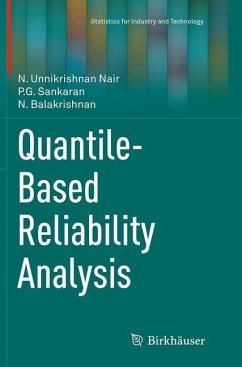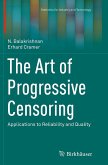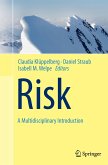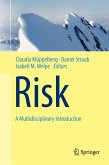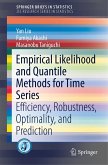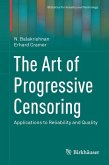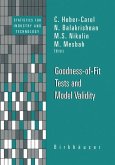Quantile-Based Reliability Analysis presents a novel approach to reliability theory using quantile functions in contrast to the traditional approach based on distribution functions. Quantile functions and distribution functions are mathematically equivalent ways to define a probability distribution. However, quantile functions have several advantages over distribution functions. First, many data sets with non-elementary distribution functions can be modeled by quantile functions with simple forms. Second, most quantile functions approximate many of the standard models in reliability analysis quite well. Consequently, if physical conditions do not suggest a plausible model, an arbitrary quantile function will be a good first approximation. Finally, the inference procedures for quantile models need less information and are more robust to outliers.
Quantile-Based Reliability Analysis's innovative methodology is laid out in a well-organized sequence of topics, including:
· Definitions and properties of reliability concepts in terms of quantile functions;
· Ageing concepts and their interrelationships;
· Total time on test transforms;
· L-moments of residual life;
· Score and tail exponent functions and relevant applications;
· Modeling problems and stochastic orders connecting quantile-based reliability functions.
An ideal text for advanced undergraduate and graduate courses in reliability and statistics, Quantile-Based Reliability Analysis also contains many unique topics for study and research in survival analysis, engineering, economics, and the medical sciences. In addition, its illuminating discussion of the general theory of quantile functions is germane to many contexts involving statistical analysis.
Quantile-Based Reliability Analysis's innovative methodology is laid out in a well-organized sequence of topics, including:
· Definitions and properties of reliability concepts in terms of quantile functions;
· Ageing concepts and their interrelationships;
· Total time on test transforms;
· L-moments of residual life;
· Score and tail exponent functions and relevant applications;
· Modeling problems and stochastic orders connecting quantile-based reliability functions.
An ideal text for advanced undergraduate and graduate courses in reliability and statistics, Quantile-Based Reliability Analysis also contains many unique topics for study and research in survival analysis, engineering, economics, and the medical sciences. In addition, its illuminating discussion of the general theory of quantile functions is germane to many contexts involving statistical analysis.
From the book reviews:
"This book introduces quantile-based reliability analysis. It gives a novel approach to reliability theory using quantile functions in contrast to the traditional approach based on distribution functions. ... This book has a broad applicability across fields such as statistics, survival analysis, economics, engineering, demography, insurance, and medical science. It can be used as an excellent reference book for faculty and professionals." (Yuehua Wu, zbMATH 1306.62019, 2015)
"The reviewer finds it to be a good and quite exhaustive collection of results that are centered around quantile-based notions involving life distributions. Any researcher in the areas of probabilistic or statistical reliability theory may find this monograph to be a useful reference book." (Moshe Shaked, Mathematical Reviews, April, 2014)
"This book introduces quantile-based reliability analysis. It gives a novel approach to reliability theory using quantile functions in contrast to the traditional approach based on distribution functions. ... This book has a broad applicability across fields such as statistics, survival analysis, economics, engineering, demography, insurance, and medical science. It can be used as an excellent reference book for faculty and professionals." (Yuehua Wu, zbMATH 1306.62019, 2015)
"The reviewer finds it to be a good and quite exhaustive collection of results that are centered around quantile-based notions involving life distributions. Any researcher in the areas of probabilistic or statistical reliability theory may find this monograph to be a useful reference book." (Moshe Shaked, Mathematical Reviews, April, 2014)

